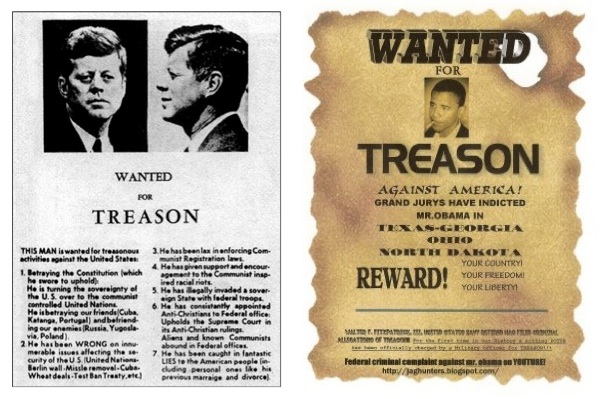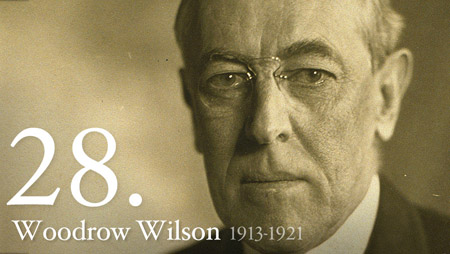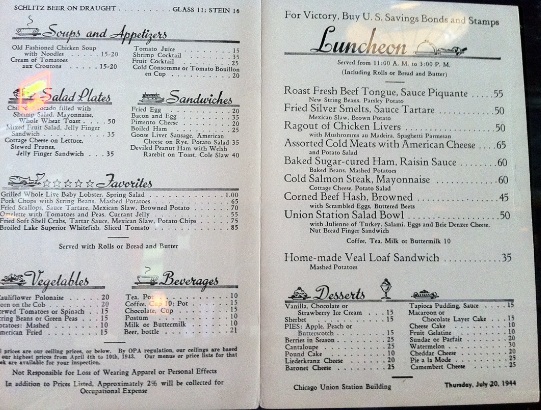U.S. History posts
Wednesday August 06, 2014
How Gender was Added to the 1964 Civil Rights Act
The New Yorker's Louis Menand, reviewing Clay Risen's “The Bill of the Century” and Todd Purnam's “An Idea Whose Time Has Come,” has a good article, “The Sex Amendment,” on how gender was added to Title VII of the 1964 Civil Rights Act and thus changed the world. It's less heroic than you might think. Would you believe it was added by an anti-union, pro-business Republican congressman from Virginia?
Menand also goes into the history of women and African Americans—specifically white women and African-American men—butting heads over who should go first through the doorway in the battle for equal rights. He quotes Frederick Douglass speaking at an American Equal Rights Association meeting in 1869 about how women should have the same urgency for equal rights when they're hunted down, lynched, etc. Susan B. Anthony then responded thus in favor of women's rights first:
If you will not give the whole loaf of suffrage to the entire people, give it to the most intelligent first. If intelligence, justice, and morality are to have precedence in the Government, let the question of woman be brought up first and that of the negro last.
Yeah: Susan B. Anthony. Which just goes to show that even if you're on the right side of history doesn't mean you're on the right side of all history.
Wednesday July 30, 2014
Rick Perlstein on the Rise of Reagan
Author Rick Perlstein's new book, “The Invisible Bridge: The Fall of Nixon and the Rise of Reagan,” which will be published this fall, is part of his series of books on the rise of the conservative right in this country. I've read the first and most of the second and plan on reading this one, too. Besides the history, it will probably spark a lot of memories, since 1972 to 1976, when I was 9 to 13, were wheelhouse years for my memory.
As part of the promo, and maybe just for general edification for folks who don't read, Perlstein has done a YouTube “History in Five” piece on the rise of Reagan. Think about the lesson as you're watching. What did Reagan believe that others didn't? I'll put my answer in the comments section.
Thursday March 13, 2014
Dueling Robert Duvall Headlines: Daily Beast vs. Breitbart
This is the headline as it appeared in The Daily Beast's Q&A with the acting legend, where it was original content:
Robert Duvall on His Storied Career, His New Movie, and Why He’s Ditching the GOP
Here's how the Brietbart site repurposed it:
Robert Duvall Blasts 'The Butler': 'Atrocities in South Committed By Democrats'
Pretty funny. It's a good Q&A, by the way, but if it were me doing the interview I would have followed up on Duvall's comments that made the Breitbart headline.
This is the graf in question:
Republicans in Hollywood seem to get a lot of flack and be a bit marginalized. Has it ever been tough, for you, to be a Republican in Hollywood?
Let me say it this way: my wife’s from Argentina, she’s been here for a while, and she’s very smart. She calls herself a “tree-hugging Republican,” but she might even vote Democrat next time because the Republican Party is a mess. I’ll probably vote Independent next time. I think it was Jack Kerouac who said something like, “Don’t run down my country. My people are immigrants, so I believe in this country with all its faults. To me, it’s a big country that’s made mistakes.” Some of the bleeding-heart left-wing, extreme left-wing, are actually different from liberals. That movie The Butler? It’s very inaccurate. JFK had one of the worst Civil Rights voting records. And the Rockefeller’s were much more liberal with the blacks. All the atrocities in the South were committed by the Democratic Party, but now, everything’s been turned around in a strange way. Some of these very conservative Republicans… I don’t know, man. I believe in a woman’s choice. I believe in certain things. I hear they booed Rick Perry last night on the Jimmy Kimmel show. But it’s a great country. We’ve done bad things. Slavery was terrible. One-third of all Freedmen in New Orleans fought for the South. I can’t figure that out. Those things aren’t told in the history books. There’ve been lots of contradictions and this and that. But I think the country’s okay, and hopefully it will survive.
My immediate thoughts for follow-ups:
- Is he talking about JFK's voting record as a U.S. Senator? How is that relevant to “The Butler,” which focuses on The White House from Eisenhower to Reagan?
- And surely Duvalls knows the significant progress the country made in civil rights during JFK's short term in office. And surely he knows the speech JFK gave in June 1963, during Birmingham, which finally owned up to federal responsibility on civil rights matters. These are not small things. It matters what the president says.
- And is he truly confused on Southern atrocities committed by Democrats? Again, doesn't he know that the Democratic party, from FDR to JFK, was a party of both northern progressives and southern Dixiecrats, and that most national Democrats were forced to walk the thin line between the two; and that JFK and LBJ were the national figures who finally made the irrevocable step onto the progressive side, turning the Dixiecrats into Republicans? “We've lost the South for a generation,” LBJ said after signing the Civil Rights Act in 1964. He was only wrong in underestimating the amount of time. It's been two-plus generations. And counting.
Anyone who blames “Democrats” for southern civil rights violations, without owning up to the fact that these folks make up the heart (or lack) of the modern GOP, is basically involved in a propaganda campaign. Right, Breitbart?
Duvall's right on one aspect of all this: “The Butler” was inaccurate. Worse, it wasn't very good.
The rest of Marlow Stern's Q&A, about Marlon Brando and Matthew McConaughey, Dustin Hoffman and Gene Hackman, is a lot of fun to read.
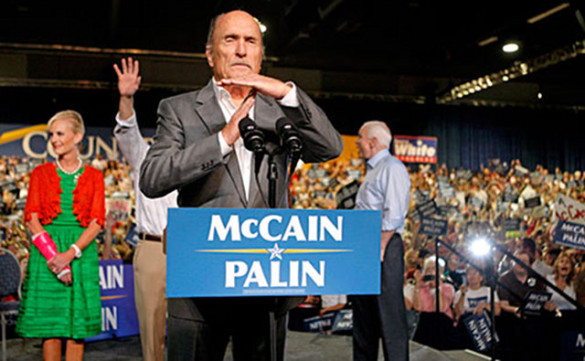
Robert Duvall signaling for quiet; or maybe a do-over on the VP choice.
Friday February 07, 2014
'The Beatles Invade, Complete with Long Hair and Screaming Fans'
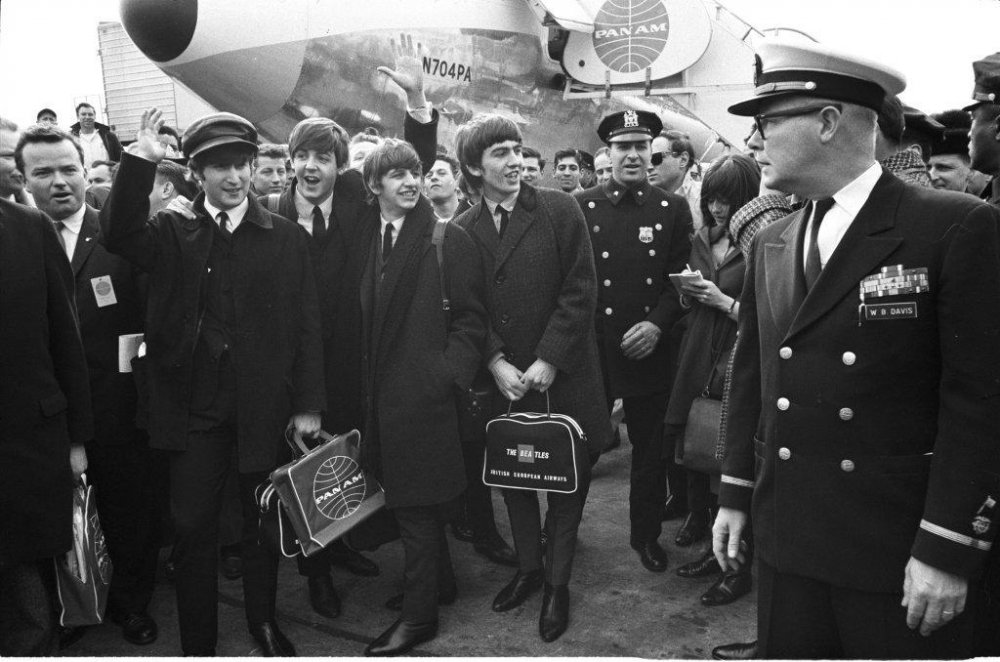
The Beatles, and Arthur, arrive at Kennedy airport: February 7, 1964. Photo by Bill Eppridge
Certain dates mean something to me. Some are birthdates: Jan. 11, 19, 23. February 25. April 28. July 4, 7, 8 and 13. October 30.
Some are assassination dates: April 4, June 6, November 22, September 11.
Then there's a date that doesn't have any contemporaries: February 7. That's the day the Beatles arrived. I'll always think of it as the day the Beatles arrived. Fifty years ago today.
I was always a bit backward-looking. I grew up with “Sgt. Pepper” and the White Album, and in the summer of '73, when I was 10, we got the red and blue albums, their greatest hits, and later, in junior high and high school, I picked up the remainder. I got them all. By college I was digging after scraps: “The Beatles Talk Downunder,” which is just that, recordings of press conferences from their 1964 trip to Australia. I read and re-read Philip Norman's biography “Shout!: The Beatles in Their Generation.” I was collecting what articles I could. Some of them I stole from the college library. Awful, really. But I had this need.
I remember my father having to explain to me that the Beatles were always considered long-haired. I think we were looking at the blue and red albums in the summer of '73 and I mentioned I liked the Beatles better short-haired, and he said, “Actually that was considered long hair back then.” I couldn't comprehend it. I couldn't wrap my mind around it. That's how much influence they had. Would hair have exploded that way without them? Would rock 'n' roll?
Our family friend Lynn likes to tell a story from about 1969 when her son Ben and I were both 6 years old. I had traveled with them from Minneapolis to their summer place in Charlevoix, Michigan, and Lynn was in the kitchen, and Ben and I were down the hall in the bedroom where she could hear us talking. Apparently it went something like this:
Me: Mine's longer.
Ben: No, mine's longer.
Me: How can you say that? See?
Ben: [Pause] Well, if I pull on mine, mine's longer.
At which point she hurried to the bedroom to end the game ... and saw us kneeling in front of the mirror and pulling our hair down our foreheads towards our eyes. We wanted to be Beatles.
The foreignness of the Beatles when they first arrived is the thing that's hard to grasp for people like Ben and I who came later. When they arrived they were the freak show to the establishment. But then they became the standard and it was the establishment—skinny ties and greasy hair and overall squareness—that became the freak show. You pick up intimations of how they were viewed from contemporary pop cultural artifacts. The Way Outs from “The Flintstones.” The Mosquitos from “Gilligan's Island.” The articles of the day, with their references to long hair and “buginess.” The title of this blog post was the title of the New York Times article from Feb. 8, 1964 by Paul Gardner. It began:
Multiply Elvis Presley by four, subtract six years from his age, add British accents and a sharp sense of humor. The answer: It's the Beatles (Yeah, Yeah, Yeah).
In college I wanted to write a story about February 1964. I thought of a kid in New York devastated by November 22, 1963, and fearful, looking up at the tall buildings and thinking an assassin could be in any of them. Then the Beatles arrived and swept it all away with their energy and yeah-yeah-yeah music. They arrived and he was part of that mad rush at them. He wandered New York looking up at the buildings and thinking the Beatles could be in any of them.
It was supposed to be a microcosm of the way historians wrote about the Beatles and our early interest in the Beatles. They swept away scandal and tragedy. In Britain, the Profumo scandal in the summer of '63 led to Beatlemania that fall. In the U.S., November 22 led to February 7. We needed to think about something else.
But it would've been nothing without the music to go with it. Everyone still likes the music. My nephews, the kids of friends, they all like the Beatles. The Beatles swept away 1950s rock 'n' roll but nothing's really swept them away: not punk, not grunge, not rap. It's still here after 50 years. Fifty years. Shit, you know how long that is? Fifty years before I was born, World War I hadn't even started. It was that world. But 50 years later we're still living in the world the Beatles created.
Monday December 30, 2013
The 10 Most Outstanding People in the World, According to Students at Northwestern's Medill School of Journalism in 1927
Here's the list:
- Charles Lindbergh
- Richard Byrd
- Benito Mussolini
- Henry Ford
- Herbert Hoover
- Albert Einstein
- Mahatma Gandhi
- George Bernard Shaw
- Bobby Jones
- Al Capone
I came across the list near the end of Bill Bryson's much-recommended book, “One Summer: America, 1927,” during his section on Al Capone. But it's worth running down the whole list.
The top two are both aviators in a year famous for aviation. Lindbergh's fame, of course, survives; Byrd's doesn't, even though, at the beginning of that year, Byrd was the better-known of the two. But according to Bryson, Byrd's fame deserves to have faded since he was something of a charlatan.
Two politicians make the list, Mussolini and Hoover, both known for making trains (real or metaphoric) run on time. Neither fared well with history. Wait, I guess Gandhi was a politican, too. So three. Gandhi has fared best of all. He still makes an impact as example rather than negative example.
Only one businessman: Ford. Two if you count Capone—which Bryson does—and in some ways Capone has fared better historically than Ford. Bryson isn't much of a fan of the automaker, either. He gives credit where it's due but sees him mostly as a crank and anti-Semite. Capone? He simply saw a need and filled it. With a Tommy gun in hand.
Rounding out the list: one scientist, one athlete, one writer. Interestingly, Bobby Jones trumped both Jack Dempsey (in the year he lost to Gene Tunney) and Babe Ruth (in the year he hit 60 homeruns). In his book, Bryson writes often of Ruth, often of Dempsey, but never of Jones. I wonder why.
Worth noting, too, who's not on the list: President Calvin Coolidge, famously taciturn. He'd probably approve.
I'd be curious if such lists today ever include writers and scientists. Or gangsters and fascists.
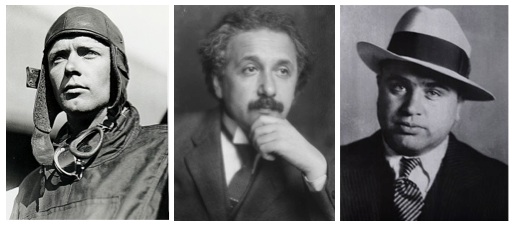
The great men of 1927: Lindbergh, Einstein, Capone.
Friday November 22, 2013
'From Dallas, Texas, the Flash Apparently Official ...'
Fifty years ago today, my mother (of two children then) met my father, a young reporter at the Minneapolis Tribune, for a Friday lunch at a downtown restaurant. Apparently they heard the news from their waiter, but I don't know if the news they heard was “shot” or “dead.” My father didn't even know what the waiter was talking about. The president? The president of the restaurant? What president? “President Kennedy,” he was told. Thus they knew before everyone else in the restaurant. For the rest, it was still an ordinary Friday lunch, and there was talk and laughter and clinking of glasses and silverware. In the tellings since, this always feels like the worst part. Tragedy has already enveloped my mother and father, yet all around them is chatter and laughter.
Eventually, someone came out and made an official announcement and my father rushed back to the Tribune to see if he could be of use. He helped put together a photo essay on Pres. Kennedy. He remembers tears welling up in his eyes when he came across the famous White House photo of John-John playing beneath the presidential desk.
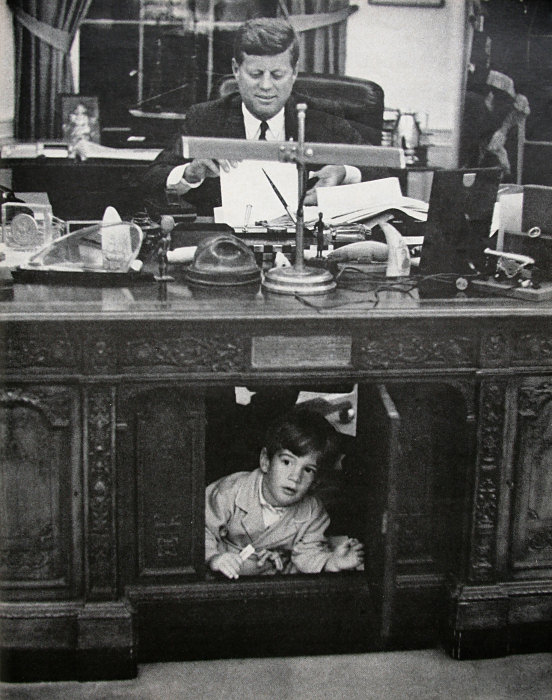
ADDENDUM: Comments from my father: You nailed it — the surreal horror of knowing of tragedy before anyone else in the room. No one made an announcement, though. What happened was that the background music was suddenly interrupted by the voice of Walter Cronkite as the people around us gradually understood what had happened.
The waiter told us as he brought my beef stroganoff. I didn't eat beef stroganoff again for a dozen years.
Tuesday October 15, 2013
Heading Into Nut Country: From Dealey Plaza to the Tea Party
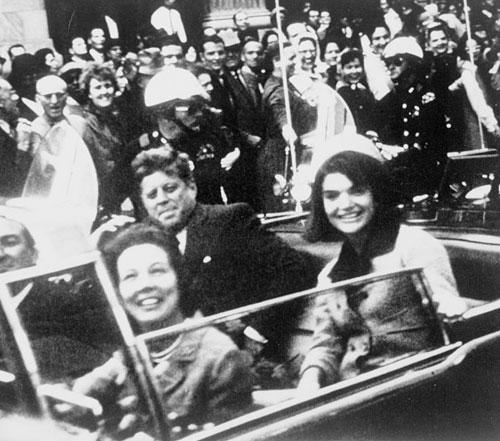
George Packer has a good piece in The New Yorker called “Leaving Dealey Plaza,” about the Kennedy assassination, whose 50th anniversary is upon us and Dallas. He opens in this haunting fashion:
Ever since the age of seven, I’ve been obsessed with the assassination of John F. Kennedy. It took place when I was three, and though I have no memory of hearing the news, the President’s murder, in Dallas, hung over my childhood with the vivid and riveting terror of a dream. On my parents’ bookshelf, there was a slender, crimson-jacketed pictorial account of November 22, 1963—fifty years ago next month—and the days that followed, by the photographers of the Associated Press, called “The Torch Is Passed.” I would sit by myself for what felt like hours and stare at the black-and-white stills—the roses in Jackie’s arms at Love Field; the open Presidential limousine gleaming in the sunlight; the waving, unknowing crowds; Kennedy’s smile in the images just before the first shot; Jackie’s face turning toward him as his fists jerk up to his throat; the black shoe hanging over the back of the seat as the limo speeds away toward the underpass.
Recently he visited Dallas for the first time, so he went, like I went, to Dealey Plaza. He found it much like he'd always imagined it whereas I'd always thought it was located in the center of the city. Not sure why. Because it's central to our history? Instead it's on the edge of the downtown area. It's on the extreme edge. It's the road you take before leaving the center forever.
Packer's article is about the extremism in Dallas at the time, and the hatred—“We're heading into Nut Country,” Jack apparently told Jackie on the flight down—and the difficulty Dallas has dealing with the crime. It's the city that killed the president. Then Packer makes the inevitable update, the inevitable warning, the plus ca change warning. That hatred of Kennedy isn't gone, it's just been transferred. In 50 years, as the rest of us have progressed, the extreme right has managed to change one letter: they've gone from Birchers to Birthers. Nut Country is more diffuse now. It's also in the halls of power. Packer concludes:
Last week, as part of the anniversary build up, the Morning News ran a brutally honest article about the city fifty years ago. The piece quotes Darwin Payne, a historian and former Dallas newspaperman: “You could feel it in the air. When I hear some people express hatred for Obama, it feels the same. But I never have felt we are on the verge of anything like the events I witnessed back then.”
American politics today isn’t haunted by the same fear of sudden, shattering violence. But, as for nut country, it’s migrated from the John Birch Society bookstores to the halls of Congress, where angry talk of socialism and impeachment is almost routine. Senator Ted Cruz and Representative Louie Gohmert are the spiritual descendants of Walker and Hunt. Fifty years later, Dallas would like to move on from Dealey Plaza. This is normal and right. What’s holding it back is the Republican Party.
Tuesday September 17, 2013
Woodrow Wilson, With a Message for the Originalists
Here's Woodrow Wilson in 1908 in his book, “Constitutional Government in the United States,” arguing against, of all ideas, checks and balances:
The trouble with the theory is that government is not a machine, but a living thing. It falls, not under the theory of the universe, but under the theory of organic life. It is accountable to Darwin, not to Newton.
I came across it while reading Jill Lepore's article, “The Tug of War: Woodrow Wilson and the power of the Presidency,” which is ostensibly a book review, or books review (“Wilson” by A. Scott Berg; “Woodrow Wilson” by John Milton Cooper, Jr.), but which ranges more into the life, and into the office, than into the books. That link to the article, by the way, is just to a snyopsis. For the full thing you need the magazine. Which you should get. Sept. 9, 2013.
Helluva rise for Wilson. Named president of Princeton in 1902. Elected governor of New Jersey in 1910. Elected president of the United States in 1912 and again in 1916. Helluva fall as well: illness and incapaciation. The elections, meanwhile, required help: Teddy Roosevelt's Bull Moose Party splitting the Republican vote in the first; winning 10 of the 12 states where women could vote in 1916. I hadn't realized suffrage had been a state by state thing before the 19th amendment.
He was the first Southerner since the Civil War to be president. James Weldon Johnson said he “openly condoned and vindicated prejudice against the Negro.” His wife died in office; he remarried in office; his second wife ran things during his incapacitation.
Lepore also reminds us of the swift change of things: “During Wilson's Adminstration, Congress lowered the tariff, reformed banking and currency laws, passed a new antitrust act, instituted a graduate income tax and the first federal inheritance tax, passed the first private-sector-eight-hour-workday legislation and the first federal aid to farmers, abolished child labor, and established the Federal Trade Commission and the Federal Reserve. Wilson believed that it was the obligation of the federal government to regulate the economy to protect ordinary Americans 'from the consequences of great industrial and social processes which they cannot alter, control, or singly cope with.'”
Are Democrats more likely than Republicans to be academics? From this list it seems so: Wilson, LBJ, Clinton, Obama. Also, look at all the Navy boys.
Thursday September 12, 2013
The Most Horrible Thing I've Ever Heard
Lately I’ve been reading “Popular Crime: Reflections on the celebration of violence,” by Bill James. Yes, that Bill James. Along with baseball stats, he’s apparently got a bit of a crime-story fixation. He considers himself an amateur sleuth. He has a few corrections in mind for the justice system.
In the book, he goes over some of the more famous murder cases in American history (Lizzie Bordon, Lindbergh Baby, O.J.), some sensational cases in their day that have receded from view (Elizabeth Canning, Mary Rogers, Hall-Mills), and he has a chapter on serial killers that will make you want to flee the planet.
He also talks about the most famous American murder of the 20th century: John F. Kennedy. And it’s there that I read one of the most horrible things I’ve ever read.
James begins many of his discussions by saying, basically, I’m just some guy; what the hell do I know? Then he tells you what the hell he knows. This is particularly true here. He says there are a zillion books on the JFK assassination—that you can read one a month for 20 years and not be done—but he can recommend two: Gerald Posner’s “Case Closed” and Bonar Menninger’s “Mortal Error.” I was familiar with the first (Oswald did it, by himself, get over it) but not the second, and that’s the one he really recommends.  It’s based on the work of Baltimore ballistics expert Howard Donahue. In 1967, CBS News was attempting to recreate what Oswald had done to see that it could be done—to see if someone could hit a target at that distance with that gun three times in 5.6 seconds. So they hired Donahue. Who did it in 5.2 seconds. Case closed.
It’s based on the work of Baltimore ballistics expert Howard Donahue. In 1967, CBS News was attempting to recreate what Oswald had done to see that it could be done—to see if someone could hit a target at that distance with that gun three times in 5.6 seconds. So they hired Donahue. Who did it in 5.2 seconds. Case closed.
Except Donahue became fascinated with the assassination and did his own research and came to his own conclusions.
Three shots were fired that day at Dealey Plaza. This is what Donahue believes happened.
He believes Oswald fired the first two shots. The first missed, but a ricocheted fragment hit the President in the neck. The second shot hit both Kennedy and Connally. Then Oswald’s gun jammed and he never got off a third shot.
So what happened? Who fired the third shot? Was it David Ferrie in the grassy knoll with the candlestick?
Here’s why Donahue believes Oswald didn’t fire the third shot:
- The third bullet disintegrated upon impact, which a bullet from Oswald’s Carcano rifle would not have.
- A Carcano round fired at that distance—from Oswald to Kennedy—would not have had the impact the third bullet that hit Kennedy did.
- A Carcano round is 6.5 millimeters in diameter. The final, fatal entrance wound was 6 mm wide.
- The trajectory of the final bullet, based upon entrance and exit wounds as well as the position of the President’s head at the time, traces back, not to the book depository, but to the car directly behind Kennedy.
And who was in the car directly behind Kennedy? The Secret Service.
No, the Secret Service wasn’t in league with LBJ and Castro and the Mafia to bring down Kennedy. In some ways, it’s worse:
... a Secret Service man, George Hickey, grabbed a weapon when he heard the first shot. Hickey’s weapon accidentally fired, and that bullet, from Hickey’s gun, mortally wounded the President.
Hickey’s gun, an AR-15, uses bullets 5.56 mm in diameter, which disintegrate upon impact. Hickey was also close enough to the President to account for the big blam of the third shot.
An accident. A fucking accident. That’s how our history changed.
The night I read this I went numb with horror.
I should add that I, like James, don’t know anything, but I really don’t know anything. I don’t know ballistics and trajectories and yadda yaddas. I haven’t studied any of it.
But I know what makes sense. Here’s James:
On first hearing this theory, almost no one believes that it could be right. ... But I have read Mortal Error carefully, and I have to tell you, if there’s a flaw in his argument I don’t see it. Unlike the conspiracy theories, which are almost universally based on some conversations which tooks place in Russia in 1961, in New Orleans in 1962, or in Tampa in 1972, the Donahue analysis is based primarily upon a detailed, careful study of what happened in Dealey Plaza on November 22.
I still don’t know if it’s true or not. Most people think it isn’t. But of all the conspiracy theories out there, this is the one that fits my worldview. To plot out, and organize, and initiate, a murder of this size and scope, and then disappear from view? Poof? We’re just not that smart.
But a mistake? A screw-up? A horrible, horrible accident? Oh yeah. That’s us. That’s us all over.

Wednesday August 28, 2013
How the March on Washington was Viewed in 1963
From my review of “Report Civil Rights,” Library of America's massive (and much-recommended) collection of eyewitness journalistic accounts and in-depth magazine articles on the civil-rights struggle from 1941 to 1973, which appeared in The Seattle Times 10 years ago:
Appropriately, some of the articles upend our warm, hazy view of [the March on Washington].
True, E.W. Kenworthy of The New York Times wrote that the demonstration had “an air of hootenanny about it”; but Russell Baker reminds us that by the time Dr. King spoke, “huge portions of the crowd had drifted out of earshot,” while civil-rights worker Michael Thelwell details how the Kennedy administration hijacked the march's original intent — a one-day sit-in to “completely immobilize the Congress” — and turned it into something “too sweet, too contrived, and its spirit too amiable to represent anything of the bitterness that had brought the people there.”
Bitterness? The March on Washington? Indeed. In Marlene Nadle's Village Voice article, in which a busload of New Yorkers ride to the march, a white Peace Corps volunteer talks, with perhaps too much paternalism, about why he wants to help Nigeria. Suddenly a black activist shouts, “If this thing comes to violence, yours will be the first throat we slit. We don't need your kind. Get out of our organization.”
To me, though, the most fascinating thing about the Library of America collection remains its lessons in journalistic objectivity.
From 1946 to 1963, most articles gave both sides of the argument, black rights vs. states' rights, and the journalist didn't choose sides. This is what Negroes think, this is what Southerners think. Decide for yourself.
That began to change after Birmingham, the March on Washington, and the JFK assassination. Among the societal assumptions ecompassed within journalistic objectivity, in other words, was the assumption, post '63, that Negroes had gotten a raw deal in the South and beyond. “The moral issue was simply too stark, and segregationist logic too twisted,” I wrote 10 years ago. “By June 1963, even The New York Times was referring to the White Citizens Council as 'a racist organization.'”
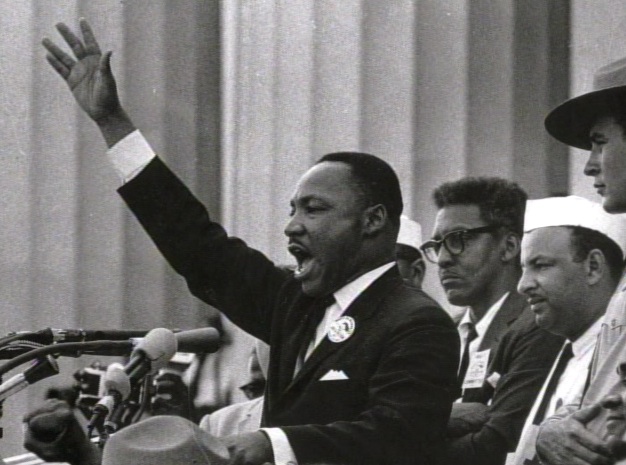
“It is a dream deeply rooted in the American dream ...”
Tuesday August 20, 2013
A 1944 menu in Stephenson, Wash.
Because we would have arrived at Wendy's place in Prindle, Wash., in the awkward hour after lunch without having had anything to eat, and because the paper-mill smell in Washougal was making one of our party lose his appetite, and because we didn't find much in Skamania or Bonneville, we ate lunch at the Big River Grill in Stephenson, Washington, much recommended, where we found this on the wall of our booth:
Click for a bigger view
The building has been there since the '20s, and was restored in the '90s, and it has a lot of license plates on the wall, along with a lot of good nostalgic items, meaning they are not overdone and seem specific to the location. Well, OK, so this is a menu from the Chicago Union Station Building. I still like it. I like the war bonds slogan. I like the use of “wearing items” for “clothes,” and “occupational expense” for “tip.” I like that there's a day on the menu, as if they change it every day. I like that this day is the same day a group of Nazis attempted to assassinate Hitler, and that, 25 years later, man walked on the moon. From the middle of World War II to walking on the moon. Talk about a giant leap for mankind.
What would you get? I might go traditional and go for the pork chops, mashed potatoes and string beans, and, for desert, butterscotch pie a la mode. Assorted cold meats looks pretty good, too.
OPA, by the way, is Office of Price Administration, which was created in 1941 and abandoned in 1947. Some of its powers were transferred to the FTC.
Thursday August 15, 2013
Does Anyone Know What the Civil Rights Movement Is Anymore?

The other day a Facebook friend directed me to Ann Hornaday's Washington Post article about how “The Butler,” or “Lee Daniels' The Butler,” will finally be putting the Civil Rights Movement on the big screen. Then she admits this:
“The Butler” largely focuses on Gaines’s family life and interactions with the presidential families he serves. But it also chronicles the burgeoning movement taking shape on the streets far beyond 1600 Pennsylvania Ave.
Exactly. It's the ups and downs of one fictional family—at least a black family this time—as seen against a backdrop of some aspects of the Civil Rights Movement. It's some mix of “Dowtown Abbey,” U.S. version, and “The Help.” It's a 21st-century “Backstairs at the White House,” which itself was a mix of “Upstairs, Downstairs” and “Roots.” But it's hardly a big-screen rendition of the Civil Rights Movement.
I've complained about this paucity from so-called liberal Hollywood before. Here, for example. And here.
But “The Butler” is a start, right? It's an attempt. That's mostly what Hornaday is saying. Particularly on the second and third pages of her essay, which go into the usual sad complaints that Hollywood studios only back superhero and tentpole movies rather than dramas.
And then you read the comments to her article.
I know. Never read the comments. It's the online version of “Never get off the boat.” And yet there they were.
The first commenter refuted the notion that we haven't portrayed the Civil Rights Movment on the big screen:
Mississippi Burning
Malcolm X
Ghosts of Mississippi
To Kill a Mockingbird
I'm sure there are others I can't remember.
The second one piled on:
Remember the TItans
Guess Who's Coming to Dinner
A little American History 101 (or is it Movie History 101?) for the kids:
- Mississippi Burning: A glorification of the FBI during a fictionalized account of the murders of Goodman, Chaney and Schwerner in Mississippi in 1964. Black people in the movie are mostly backdrops. They are incidental characters in their own story.
- Malcolm X: About the man who brought the Nation of Islam to prominence. But this is not about the Civil Rights Movement. It's about a different kind of separatism rather than an attempt at integration.
- Ghosts of Mississippi: More white people wrangling over black tragedy: this time, the murder of Medgar Evers in June 1963.
- To Kill a Mockingbird: Set in the 1930s, it has nothing to do with the Civil Rights Movement.
- Remember the Titans: Set in the 1970s, it's about football. (But it does have a good line by Denzel.)
- Guess Who's Coming to Dinner: A white famly wrangles with the prospect of their daughter marrying a handsome doctor.
Seriously, does anyone know what the Civil Rights Movement is anymore?
All previous entries
Baseball's Active Leaders, 2023
What Trump Said When About COVID
Recent Reviews
Everything Everywhere All at Once (2022)
Black Panther: Wakanda Forever (2022)
Doctor Strange in the Multiverse of Madness (2022)
Spider-Man: No Way Home (2021)
The Cagneys
A Midsummer Night's Dream (1935)
Something to Sing About (1937)
Angels with Dirty Faces (1938)
A Lion Is In the Streets (1953)
Man of a Thousand Faces (1957)
Never Steal Anything Small (1959)
Shake Hands With the Devil (1959)







